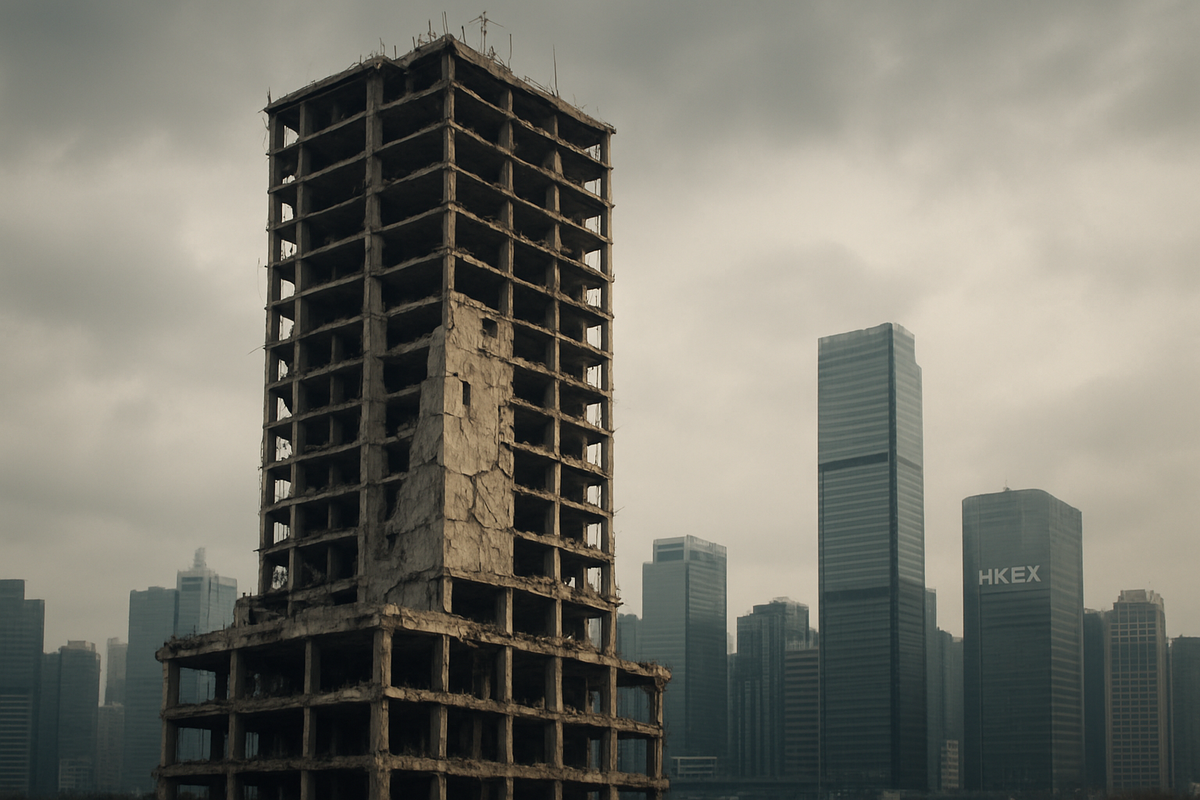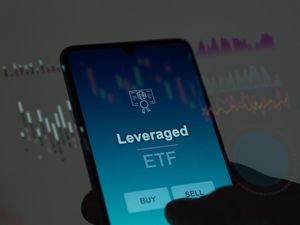
Hong Kong, October 24, 2025 – Sunkwan Properties Group Limited (HKEX: 6900) is poised for a definitive exit from the Hong Kong Stock Exchange (HKEX), with its official delisting scheduled for October 27, 2025. This imminent removal marks a critical juncture for the embattled property developer and sends a chilling signal across China's already beleaguered real estate sector. The delisting comes after Sunkwan failed to meet crucial resumption guidance set by the HKEX by the October 1, 2025 deadline, ending an 18-month trading suspension that began in April 2024.
The cancellation of Sunkwan Properties' listing is not merely a corporate event; it's a stark reminder of the persistent liquidity crunch, governance failures, and regulatory pressures reshaping the landscape of Chinese real estate. For shareholders, the immediate implication is a complete loss of public market liquidity, rendering their holdings effectively untradable on a regulated exchange. For the broader market, it underscores the Hong Kong regulator's unwavering stance on compliance and financial viability, indicating that more such corporate casualties may follow as the sector continues its painful deleveraging process.
The Unraveling: A Detailed Look at Sunkwan's Downfall
Sunkwan Properties' journey to delisting has been a protracted and public struggle, characterized by a series of non-compliance issues and a failure to address the Hong Kong Stock Exchange's stringent requirements. The company's shares were first suspended from trading on April 2, 2024, after it failed to publish its audited annual results for the year ended December 31, 2023. This delay was a critical breach of Listing Rule 13.49(1) and was reportedly exacerbated by a significant exodus of key finance personnel, leaving the company understaffed to complete necessary audits.
Following the initial suspension, the HKEX issued specific "Resumption Guidance" to Sunkwan Properties on June 26, 2024. This guidance outlined several non-negotiable conditions for the company to resume trading, including the urgent publication of all outstanding financial results (for 2023 and the first half of 2024), demonstrating compliance with Rule 13.24 (related to sufficient operations or assets), and rectifying corporate governance deficiencies, particularly concerning the composition of its board of directors and various committees. Sunkwan had to address a lack of independent non-executive directors and other key personnel following resignations earlier in the year.
The 18-month deadline for meeting these conditions, as per Rule 6.01A(1) of the Listing Rules, expired on October 1, 2025. Despite quarterly updates from the company indicating ongoing efforts to address these issues, including actively seeking candidates for board roles and working on delayed financial reports, these efforts proved insufficient. The HKEX Listing Committee's decision, announced on October 24, 2025, confirmed that Sunkwan Properties had not fulfilled the resumption guidance by the deadline, leading to the cancellation of its listing. This definitive action signals the end of its tenure as a publicly traded entity on one of Asia's premier exchanges.
Winners and Losers: Reshaping the Real Estate Landscape
The delisting of Sunkwan Properties (HKEX: 6900) from the Hong Kong Stock Exchange, especially following the high-profile exit of China Evergrande Group (HKEX: 3333) just months prior, is more than an isolated incident; it's a potent catalyst reshaping China's real estate sector. The event will undoubtedly create distinct winners and losers, further solidifying the ongoing market consolidation.
Potential Losers:
- Highly Leveraged Private Developers: Companies with excessive debt, precarious cash flows, and a reliance on continuous refinancing face intensified scrutiny. Sunkwan's financial distress and governance issues are symptomatic of a wider problem. Developers unable to secure new loans, sell assets, or restructure debt will find it increasingly difficult to survive. Investors will become even more risk-averse towards firms with delayed financial reports, auditor resignations, or frequent management changes.
- Foreign Investors in Distressed Assets: Creditors, particularly offshore bondholders, with exposure to delisted or liquidating developers like Sunkwan, Evergrande, and China South City Holdings (HKEX: 1668), are likely to face significant losses. The Chinese government's priority on completing onshore projects for homebuyers often leaves foreign creditors with limited recovery prospects.
- Homebuyers of Unfinished Projects: While government policy aims to protect homebuyers, the collapse of developers still leaves many in limbo, facing prolonged delays or the complete cessation of construction on pre-sold properties.
Potential Winners:
- State-Backed Real Estate Companies: These entities, often enjoying stronger balance sheets and preferential access to financing from state-owned banks, are well-positioned to consolidate market share. They are perceived as more stable and align with the government's objectives for market stability and affordable housing. Companies like China Resources Land (HKEX: 1109) or Poly Developments and Holdings Group (SSE: 600048) might benefit from reduced competition.
- Financially Prudent Developers: Companies that have maintained lower leverage, strong cash flow, and diversified income streams will be better equipped to weather the downturn. They may also find opportunities to acquire distressed assets at attractive valuations.
- Property Management and Related Service Providers: As new construction slows, the focus shifts to managing existing properties, urban renewal, and providing essential real estate services. Companies in these niches, such as China Overseas Property Holdings (HKEX: 2669), could see increased demand.
- Investors with Long-Term, Value-Oriented Strategies: While the market remains volatile, the crisis may eventually present opportunities for discerning investors willing to acquire fundamentally sound assets or invest in companies poised for a more sustainable, long-term recovery.
The delisting of Sunkwan Properties thus reinforces the narrative of a market undergoing a painful but necessary cleansing, where financial discipline and robust governance are no longer optional but existential requirements.
Wider Significance: A Cleansing Fire in China's Property Sector
The delisting of Sunkwan Properties (HKEX: 6900) is far more than a footnote in corporate news; it is a profound indicator of broader industry trends and regulatory shifts gripping the Chinese real estate sector. This event, alongside the earlier delisting of industry behemoth China Evergrande Group (HKEX: 3333) and the ongoing struggles of Country Garden Holdings (HKEX: 2007) and China South City Holdings (HKEX: 1668), signifies a fundamental re-calibration driven by both market forces and aggressive regulatory intervention.
At its core, Sunkwan's demise underscores the pervasive real estate crisis fueled by an unsustainable, debt-driven growth model. For decades, Chinese developers expanded aggressively, relying on pre-sales and continuous borrowing to fund numerous projects simultaneously. The introduction of the "three red lines" policy by the Chinese government in 2020—setting strict financial thresholds for developers—was the critical turning point. This policy severely restricted highly leveraged companies' access to new financing, directly leading to the liquidity crunch that has engulfed many, including Sunkwan. The HKEX's firm stance on delisting non-compliant entities, particularly those unable to provide timely financial reports or maintain sound corporate governance, reinforces the message that the era of "growth at all costs" is definitively over.
Regulatory implications are significant. The HKEX's decision highlights a commitment to stricter enforcement of listing rules, especially concerning transparency, financial reporting, and robust corporate governance. This sets a precedent, signaling that regulators are prepared to remove financially unviable or non-compliant companies, prioritizing market integrity over the sheer number of listed entities. This intensified scrutiny is likely to continue, leading to more rigorous compliance checks for existing listings and more stringent requirements for new ones. Furthermore, it reinforces the mainland Chinese government's long-term objective of deleveraging the property sector and mitigating systemic financial risks, even as they introduce targeted stimulus measures. These measures are aimed at market stabilization and ensuring project completion for homebuyers, rather than indiscriminate bailouts for failing developers.
Historically, the current crisis echoes past periods of financial distress, though perhaps on an unprecedented scale due to the sector's size and interconnectedness with the broader economy. The delistings serve as a stark reminder of the consequences of excessive leverage and poor risk management, drawing parallels to previous financial crises where overextended companies faced similar fates. The consistent application of the HKEX's 18-month trading suspension rule leading to delisting has been a recurring theme in the downfall of several developers, demonstrating a clear regulatory framework for addressing prolonged non-compliance. This "cleansing fire" is ultimately aimed at fostering a more sustainable, less speculative, and more transparent real estate market in the long run.
What Comes Next: A Path Towards Transformation and Consolidation
The delisting of Sunkwan Properties (HKEX: 6900) on October 27, 2025, marks the end of its public market journey, but for the broader Chinese real estate market, it signifies an ongoing, painful, yet transformative period. The short-term outlook for Sunkwan itself is bleak; operating as a private entity, it will face immense pressure to restructure its substantial debt away from public scrutiny. Aggressive asset sales, intense negotiations with creditors, or even eventual liquidation remain strong possibilities, with limited recovery prospects for its shareholders and many creditors.
For the remaining real estate developers, the immediate future will be characterized by continued deleveraging and consolidation. The "three red lines" policy will maintain pressure on highly indebted firms, pushing them towards either restructuring or failure. State-backed developers will likely continue to expand their market share, benefiting from preferential financing and government support, while private developers will need to demonstrate exceptional financial prudence and strategic agility to survive. A key strategic pivot for all developers will be an unwavering focus on "guaranteed housing delivery"—completing pre-sold projects to restore severely eroded homebuyer confidence, which is a top government priority. This often involves accessing government-backed "whitelist" financing for viable projects.
In the long term, the Chinese property market is undergoing a fundamental structural transformation. The era of high debt and rapid turnover is being replaced by a model emphasizing stability, quality, and alignment with government objectives. Market opportunities may emerge in specific segments such as affordable housing, urban renewal projects, and property management services, which align with long-term policy goals. Real Estate Investment Trusts (REITs) are also gaining traction as an alternative investment vehicle, potentially offering more stable yields. However, significant challenges persist, including persistent weak consumer confidence, a vast oversupply of housing, and the ongoing risk of further developer defaults. The market will likely see continued regional divergence, with first-tier cities showing more resilience compared to struggling lower-tier cities.
Comprehensive Wrap-Up: A New Paradigm for Chinese Real Estate
The delisting of Sunkwan Properties (HKEX: 6900) is a potent symbol of the profound and ongoing recalibration within China's real estate sector. The key takeaway is clear: the speculative, debt-fueled growth model that once defined the industry is unequivocally over. This event, following in the wake of other major developer failures, underscores the Hong Kong Stock Exchange's firm commitment to enforcing robust listing rules and the Chinese government's resolve to deleverage the economy and mitigate systemic financial risks.
Moving forward, the market will be defined by increased consolidation, with state-backed entities playing a more dominant role, and a heightened emphasis on financial prudence and corporate governance for all participants. Investors should watch for the continued implementation and effectiveness of government stimulus measures, particularly the "whitelist" financing program and policies aimed at ensuring project completion. The ability of remaining developers to successfully restructure their debts and adapt their business models to a lower-leverage, quality-focused paradigm will be crucial.
The lasting impact of this crisis will be a fundamentally reshaped property market – one that is less driven by speculative growth and more by genuine demand, affordability, and stability. While the short-term outlook remains challenging, with continued price pressures and weak consumer confidence, the long-term trajectory points towards a more mature and sustainable real estate ecosystem. Investors must exercise extreme caution, prioritize companies with strong balance sheets and clear governance, and recognize that the days of easy profits in Chinese real estate are firmly in the past.
This content is intended for informational purposes only and is not financial advice





